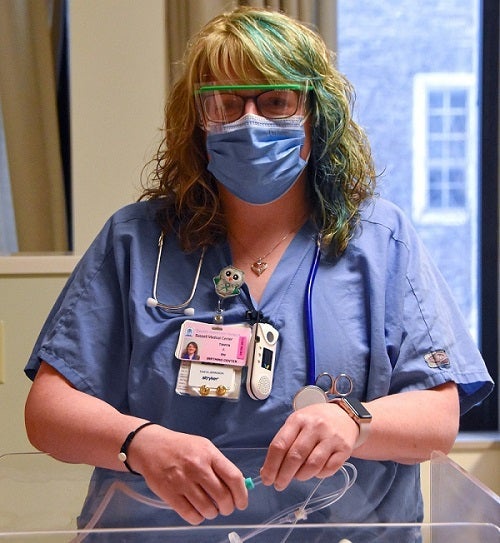Raising Awareness: One Nurse's Journey with Bile Duct Cancer
February 12, 2021Categories: Cancer Care, Bassett News
Tags: Bassett News
Tanya Jennison is used to navigating the challenges of serious health problems. As a Birthing Center nurse at Bassett Medical Center, Jennison was accustomed to being in the caregiver role. However, in December of 2019, she received a call from her primary care doctor with a devastating diagnosis for Tanya.
She had cholangiocarcinoma, or bile duct cancer.
Easily Overlooked

Jennison remembers when her symptoms started. "I was at work, feeling fine, when I suddenly had an acute, very intense pain in the upper quadrant of my belly. It was bad enough that I vomited in the bathroom. But by the afternoon, it was just a dull ache."
She was about to just go on with her life, but Ashley, a coworker and friend, intervened. Ashley recognized the symptoms as possible signs of gallbladder problems. "She would not let up for a few days. She made me do what I would tell any of my patients to do."
Jennison wouldn't have been the first to miss bile duct cancer in its early stages. Cholangiocarcinoma is not very common in the United States. Only about 8,000 cases are diagnosed each year — as compared to 240,000+ cases of female breast cancer, for example. That lack of familiarity makes the disease easy for many doctors to overlook.
An ultrasound ordered by her primary care doctor revealed an almost 5-centimeter mass in her liver. Weeks of bloodwork, scans, and a liver biopsy provided the definitive diagnosis.
"I was extremely lucky to receive my diagnosis," reflects Jennison. "The majority of patients aren't diagnosed until they become jaundiced and lose weight in Stage IV. I was only at Stage 1A, when treatment is still possible and effective."
Understanding the Diagnosis
The bile duct carries fluid produced by the liver that aids the digestion of fats in the small intestine. The types of cholangiocarcinoma are defined by where along this route the cancer originates.
Jennison had an intraheptic cholangiocarcinoma diagnosis — meaning her cancer had formed in the network of bile-collecting tubes and smaller ducts within her liver, rather than the larger duct that carries bile to the intestine. This explained the location of the mass, and shaped her treatment and recovery plan.
The Road to Recovery
Bassett Cancer Institute is able to provide the multidisciplinary care needed to manage rare and complex cancers like cholangiocarcinoma. Up until this point, Jennison had been working with Dr. Ayana Allard-Picou, a surgical oncologist, and Dr. Mohit Gupta, an interventional radiologist. Now Jennison's care team expanded to include doctors in partner institutions — Strong Memorial in Rochester and Memorial Sloan Kettering in New York City.
"I visited Sloan Kettering for a portal vein embolization," Jennison explains. "We had to grow my liver before surgery. Otherwise, I would not have enough of my liver remaining for survival."
Finally, three months after her diagnosis, Jennison had surgery to remove the mass and 75% of her liver at Memorial Sloan Kettering.
After a five week recovery, Jennison's team expanded again. Bassett medical oncologist Dr. Eric Bravin started her on eight courses of oral chemotherapy.
"It sounds easy to take chemotherapy by mouth, but swallowing the pill is the only thing easy about it. The side effects were quite difficult to navigate, challenging me personally as well as professionally. Some linger with me these many months later."
Help Along the Road
Surgery and chemotherapy stopped Tanya Jennison's cancer, but the most important element in her recovery was the support and encouragement she received from others.
"I am so glad for the support network I found in the cholangiocarcinoma community online. I have a very supportive family, but it was so encouraging to connect with people who understand the treatments and the side effects I was going through.
"And what enabled me to continue to work at the Birthing Center full-time during these many difficult months?" she asks. "The staff at the Birthing Center. My colleagues assisted me whenever possible. They were mindful of my assignments and sometimes took on more difficult work to lighten my load.
"More importantly, I had their friendship. They encourage me and remind me of my strengths. They are part of my supportive family. I owe my survival through cholangiocarcinoma in part thus far to them."
February is cholangiocarcinoma and bile duct cancer awareness month. To learn more about this disease, its risk factors, its symptoms, and its treatments, visit the Cholangiocarcinoma Foundation's website.
February 12, 2021 is specifically World Cholangiocarcinoma Day. Although bile duct cancer is relatively uncommon in the United States, it is more prevalent in other parts of the world. To learn more, visit the World Cholangiocarcinoma Day's website.
Visit our Cancer Support Services page for more information about our cancer support services.
